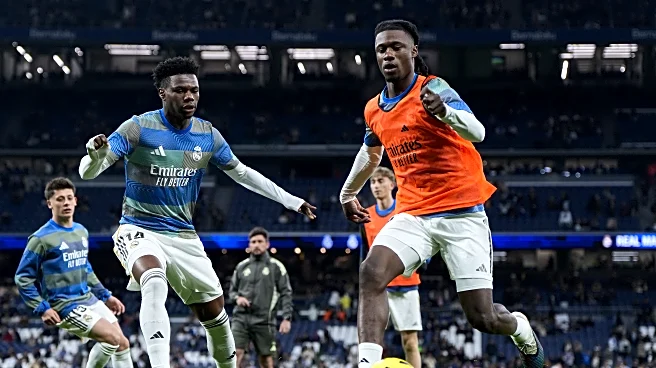What's Happening?
British officials are actively seeking to overturn a ban on Maccabi Tel Aviv soccer fans attending a Europa League match against Aston Villa due to security concerns. The decision, initially recommended
by police, has faced criticism from politicians, sports organizations, and Jewish groups. Prime Minister Keir Starmer labeled the ban as 'the wrong decision,' while UEFA has urged British authorities to ensure the Israeli team's fans can attend the match. The ban was based on public safety concerns and previous incidents involving violence and hate crimes during Maccabi Tel Aviv's matches. Culture Secretary Lisa Nandy is set to meet with the Home Office and other stakeholders to find a resolution.
Why It's Important?
The ban on Maccabi Tel Aviv fans has sparked significant controversy, highlighting issues of security, discrimination, and the role of law enforcement in sports events. The decision impacts international relations and the perception of antisemitism, as noted by Maccabi Tel Aviv's chief executive. The situation underscores the challenges of balancing public safety with the rights of fans to support their teams. The resolution of this issue could set a precedent for how similar situations are handled in the future, affecting sports diplomacy and community relations.
What's Next?
Culture Secretary Lisa Nandy's meeting with the Home Office and stakeholders is a critical step in potentially reversing the ban. The outcome of these discussions could influence future policies regarding fan attendance at high-risk matches. Stakeholders, including UEFA and Jewish groups, are likely to continue advocating for the rights of fans, emphasizing the need for safe and inclusive environments at sports events. The decision could also prompt broader discussions on security measures and discrimination in sports.
Beyond the Headlines
The controversy surrounding the ban raises deeper questions about antisemitism and discrimination in sports. The incident may lead to increased scrutiny of how security decisions are made and the potential biases involved. It also highlights the importance of international cooperation in ensuring the safety and rights of fans, which could lead to more comprehensive policies and practices in the future.











